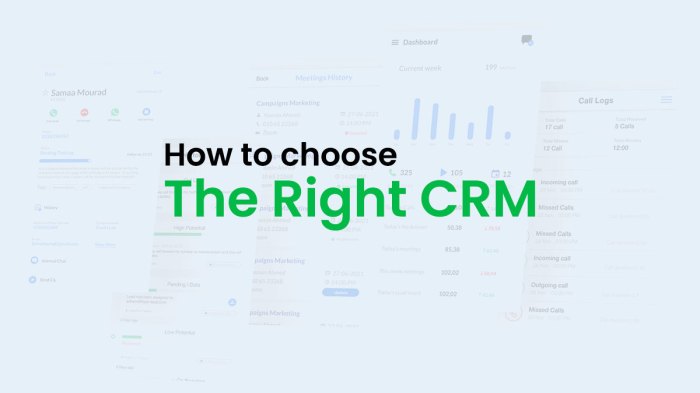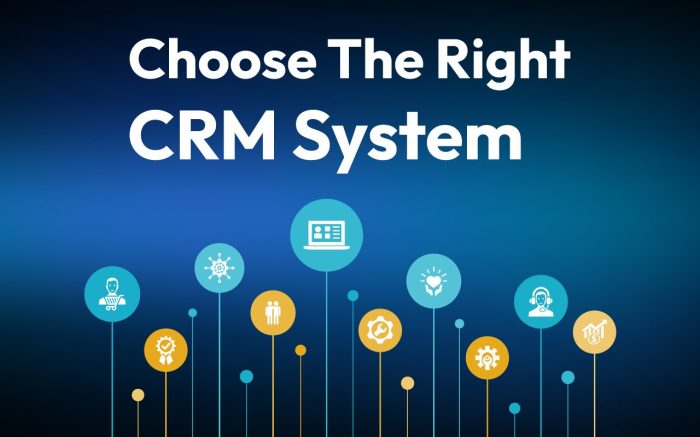Choosing the Right CRM System for Your Business
How to Choose the Right CRM System for Your Business is a crucial step for any organization looking to streamline operations and improve customer relationships. A well-chosen CRM system can automate tasks, enhance communication, and provide valuable insights into customer behavior, leading to increased sales, improved customer satisfaction, and overall business growth.
This guide provides a comprehensive approach to selecting the ideal CRM system for your unique needs. We will explore key considerations, such as understanding your business needs, evaluating CRM features, researching providers, and conducting thorough demos and trials. By following these steps, you can ensure that you choose a CRM system that aligns perfectly with your business objectives and empowers you to achieve your goals.
Understanding Your Business Needs

Before diving into the vast ocean of CRM options, it’s crucial to understand your business needs. This step sets the foundation for selecting a system that aligns with your goals and effectively supports your operations.
Identify Key Business Processes Requiring CRM Support
Understanding which business processes require CRM support is paramount. This helps you pinpoint the areas where a CRM system can enhance efficiency and effectiveness. For example, if sales is a key focus, you’ll need a CRM with strong lead management, sales pipeline tracking, and opportunity management features. Similarly, if customer service is a priority, a CRM with robust case management, knowledge base integration, and communication tools is essential.
Analyze Current Challenges and Opportunities
Analyzing your current challenges and opportunities helps you determine what a CRM system can help you achieve. Are you struggling with lead generation, customer retention, or communication breakdowns? Does your business lack a centralized view of customer interactions? Identifying these areas can guide you towards specific CRM features that address your needs. For instance, if customer retention is a challenge, you might seek a CRM with features like personalized marketing, loyalty programs, or customer segmentation tools.
Define Specific Goals for Implementing a CRM System
Defining specific goals for implementing a CRM system ensures that you’re investing in a system that will deliver tangible results. These goals could be increasing sales, improving customer satisfaction, streamlining operations, or gaining valuable insights into customer behavior. Having clear goals helps you choose a CRM system that aligns with your vision and provides the necessary features to achieve your objectives.
Assess the Size and Complexity of Your Customer Base
The size and complexity of your customer base influence the CRM system you choose. For a small business with a limited number of customers, a simple CRM solution might suffice. However, for larger businesses with diverse customer segments and complex interactions, a more robust and scalable CRM system is necessary. Consider factors like the number of contacts, the volume of interactions, and the level of customization required.
Evaluate Budget and Resource Allocation for CRM Implementation
CRM implementation involves costs beyond the initial purchase price. These include setup fees, training costs, ongoing maintenance, and potential customization expenses. Evaluate your budget and resource allocation to ensure you can afford the chosen CRM system and its associated costs. Consider the long-term implications of your investment and ensure it aligns with your overall business strategy.
Evaluating CRM Features
The core of any CRM system lies in its features and functionalities. It’s crucial to understand what features are essential for your business and which ones are merely nice-to-have. This evaluation process will guide you toward the right CRM solution that aligns with your specific needs and goals.
Contact Management
Contact management is the backbone of any CRM system. It allows you to store, organize, and manage all your customer and prospect data in one central location.
- Comprehensive Contact Information: Ensure the CRM system allows you to capture and store essential contact details like name, email address, phone number, company, job title, social media profiles, and more. This comprehensive data provides a holistic view of your contacts.
- Contact Segmentation: The ability to segment your contacts based on specific criteria, such as demographics, purchase history, or engagement level, is crucial for targeted marketing and communication. It allows you to personalize your interactions and tailor your messages for maximum impact.
- Contact Interaction Tracking: A good CRM system will track all interactions with your contacts, including emails, phone calls, meetings, and social media engagement. This historical data provides valuable insights into customer behavior and preferences, enabling you to build stronger relationships.
Sales Automation
Sales automation streamlines your sales processes, freeing up your sales team to focus on building relationships and closing deals.
- Lead Management: Effective lead management features help you capture, qualify, and nurture leads, ensuring that you don’t miss out on any potential opportunities. Features like lead scoring, automated lead assignment, and lead nurturing campaigns can significantly improve your sales conversion rates.
- Opportunity Management: Tracking and managing sales opportunities within a CRM system provides a clear view of your sales pipeline. You can monitor the progress of each opportunity, forecast potential revenue, and identify areas for improvement.
- Sales Forecasting: Accurate sales forecasting is essential for making informed business decisions. A CRM system with robust forecasting capabilities can help you predict future revenue, allocate resources effectively, and plan for growth.
Marketing Automation
Marketing automation allows you to automate repetitive marketing tasks, saving time and improving efficiency.
- Email Marketing: Sending personalized email campaigns to segmented audiences is a powerful way to nurture leads, promote products, and stay top-of-mind with your customers. Look for CRM systems with email marketing features that allow you to create professional-looking emails, track open and click-through rates, and analyze campaign performance.
- Social Media Marketing: Integrating your social media marketing efforts with your CRM system can help you manage your social media presence, track engagement, and run targeted advertising campaigns.
- Landing Pages: Creating and managing landing pages within your CRM system allows you to capture leads, collect valuable data, and track conversions. This is particularly helpful for running targeted campaigns and promoting specific offers.
Customer Service
Excellent customer service is essential for building customer loyalty and driving repeat business. A CRM system can enhance your customer service efforts by providing a centralized platform for managing customer interactions and resolving issues.
- Ticketing System: A robust ticketing system allows you to track and manage customer inquiries, requests, and complaints efficiently. Features like automated ticket assignment, escalation rules, and customer feedback mechanisms ensure that your customers receive timely and effective support.
- Knowledge Base: Providing your customers with access to a comprehensive knowledge base can reduce the number of support tickets and empower them to solve problems independently. A CRM system with knowledge base integration can help you create, organize, and manage your support articles effectively.
- Live Chat: Live chat allows you to provide real-time support to your customers directly on your website. This can be a valuable tool for addressing immediate questions, resolving issues, and improving customer satisfaction.
Reporting
Data-driven decision-making is crucial for business success. A CRM system with robust reporting capabilities can provide you with valuable insights into your customer base, sales performance, marketing effectiveness, and more.
- Pre-Built Reports: Look for CRM systems that offer a range of pre-built reports, covering key areas such as sales pipeline, customer churn, marketing campaign performance, and customer demographics. These reports provide quick and easy access to essential data.
- Custom Reports: The ability to create custom reports tailored to your specific needs is essential for in-depth analysis. Look for CRM systems that offer flexible reporting tools, allowing you to define your own data filters, metrics, and visualizations.
- Dashboards: Dashboards provide a high-level overview of your key metrics, allowing you to monitor performance at a glance. Look for CRM systems with customizable dashboards that enable you to display the most relevant information for your business.
Customization and Integration
The level of customization and integration required will depend on your specific business needs.
- Customization: Look for CRM systems that allow you to customize workflows, fields, and user interfaces to fit your specific processes and preferences. This ensures that the CRM system aligns seamlessly with your existing operations.
- Integration: Consider the need to integrate your CRM system with other business applications, such as your accounting software, marketing automation platform, or e-commerce store. Look for CRM systems that offer a wide range of integrations and APIs to facilitate seamless data exchange.
Mobile Accessibility and User-Friendliness
In today’s mobile-first world, it’s essential to have a CRM system that is accessible from anywhere, anytime.
- Mobile App: Look for CRM systems that offer dedicated mobile apps for both iOS and Android devices. These apps should provide a user-friendly interface and access to core CRM functionalities, allowing your team to stay connected and productive on the go.
- User Interface: The CRM system should have a clean and intuitive user interface that is easy to navigate and understand. This ensures that your team can quickly learn and adopt the system, maximizing its effectiveness.
Training and Support Resources
Implementing a new CRM system can be a significant change for your business. Look for CRM providers that offer comprehensive training and support resources to ensure a smooth transition and ongoing success.
- Training Materials: The CRM provider should offer a variety of training materials, including online courses, webinars, documentation, and tutorials. This will help your team learn the system’s features and functionalities effectively.
- Customer Support: Look for CRM providers that offer reliable customer support, including phone, email, and live chat options. This ensures that you can get help when you need it, addressing any issues or questions promptly.
Researching CRM Providers: How To Choose The Right CRM System For Your Business

Now that you have a clear understanding of your business needs and the features you require in a CRM system, it’s time to dive into the exciting world of CRM providers. The market is brimming with options, each offering a unique blend of features, pricing models, and support.
Exploring Popular CRM Platforms
Understanding the strengths and weaknesses of different CRM platforms is crucial. Popular platforms like Salesforce, HubSpot, Zoho, Microsoft Dynamics 365, and Pipedrive are widely used by businesses of all sizes. These platforms cater to various industries and offer a comprehensive suite of features, including sales automation, marketing automation, customer service, and analytics.
- Salesforce: A leading CRM platform known for its robust features, scalability, and extensive ecosystem of integrations. It caters to large enterprises and offers a wide range of solutions, including sales, service, marketing, and analytics.
- HubSpot: A popular choice for growing businesses, HubSpot offers a user-friendly interface, integrated marketing and sales tools, and affordable pricing plans. It’s particularly well-suited for businesses focused on inbound marketing and lead generation.
- Zoho: An all-in-one business platform that includes CRM, along with other tools like email marketing, project management, and accounting. Zoho offers a comprehensive solution for businesses looking for a single platform to manage various aspects of their operations.
- Microsoft Dynamics 365: A powerful CRM platform integrated with Microsoft’s suite of productivity tools. It offers a strong focus on business intelligence and data analytics, making it suitable for businesses seeking advanced reporting capabilities.
- Pipedrive: A sales-focused CRM platform designed to simplify sales processes and improve pipeline visibility. It offers intuitive features for managing leads, deals, and sales activities.
Researching Customer Reviews and Testimonials
Reading customer reviews and testimonials can provide valuable insights into the real-world experiences of users. Platforms like G2, Capterra, and TrustRadius offer comprehensive reviews and ratings for various CRM providers. These reviews can help you understand the strengths and weaknesses of each platform, including their ease of use, customer support, and overall value.
Comparing Pricing Models and Subscription Options
CRM providers offer various pricing models and subscription options. Some platforms offer tiered pricing based on the number of users or features, while others have flat monthly fees. It’s essential to carefully evaluate the pricing structure of each provider and compare it to your budget and projected usage. Consider factors like:
- Monthly or annual subscriptions: Determine which option offers the best value for your needs.
- Tiered pricing based on features: Understand the features included in each tier and choose the plan that aligns with your requirements.
- Per-user pricing: Evaluate the cost per user and factor in your anticipated user growth.
- Hidden fees or add-ons: Be aware of any additional costs, such as integration fees, training costs, or support fees.
Evaluating the Provider’s Reputation for Reliability and Security
Reliability and security are crucial considerations when choosing a CRM provider. You need to ensure that the provider has a track record of uptime and data security. Look for providers with:
- Strong security measures: Data encryption, access controls, and regular security audits are essential for protecting sensitive customer information.
- High uptime guarantees: A reliable provider will offer high uptime guarantees to minimize disruptions to your operations.
- Positive industry reputation: Research the provider’s track record and look for industry awards or recognition for reliability and security.
Assessing the Provider’s Commitment to Ongoing Development and Innovation
A CRM provider that continuously invests in research and development is more likely to stay ahead of the curve and provide you with the latest features and capabilities. Look for providers that:
- Release regular updates and enhancements: This ensures that the platform remains relevant and addresses evolving business needs.
- Offer a roadmap for future development: A clear roadmap Artikels the provider’s vision for the platform and provides insights into their commitment to innovation.
- Actively engage with the user community: A provider that actively listens to user feedback and incorporates it into product development is more likely to meet your needs.
Demo and Trial Period

The demo and trial period are crucial stages in the CRM selection process. They allow you to experience the CRM system firsthand, assess its functionality, and determine if it aligns with your business needs.
Request a Demo
Requesting a demo is the first step to getting a feel for the CRM system. It’s a live demonstration of the CRM system’s features and functionality, conducted by a CRM provider representative. This allows you to see the system in action and ask questions about specific features.
- Clarify your requirements: Before the demo, clearly define your specific requirements and expectations for the CRM system. This will ensure that the demo focuses on the features that are most important to you.
- Engage key stakeholders: Involve key stakeholders from your business, such as sales, marketing, and customer service teams, in the demo. This allows them to see how the CRM system can benefit their specific roles and responsibilities.
- Ask questions: During the demo, don’t hesitate to ask questions about the system’s features, functionality, and limitations. The demo is your opportunity to gain a comprehensive understanding of the CRM system.
Free Trial Period
A free trial period is a valuable opportunity to test the CRM system in a real-world environment. This allows you to evaluate the system’s usability, functionality, and compatibility with your existing business processes.
- Import existing data: Import your existing customer and contact data into the trial system to assess its data import capabilities and how well it integrates with your current systems.
- Test key features: Focus on testing the features that are most important to your business, such as lead management, sales pipeline tracking, customer support, and marketing automation.
- Gather feedback: Involve your team members in testing the CRM system and gather their feedback on its usability, efficiency, and effectiveness.
Evaluate and Identify Potential Challenges
During the demo and trial period, carefully evaluate the CRM system and identify any potential challenges or limitations. This includes assessing its:
- User interface and experience: Determine if the CRM system is user-friendly and intuitive for your team members.
- Integration capabilities: Evaluate how well the CRM system integrates with your existing business systems, such as email marketing platforms, accounting software, and other tools.
- Scalability and performance: Consider the CRM system’s ability to handle your current and future data volumes and user needs.
- Security and compliance: Assess the CRM system’s security features and compliance with industry regulations.
Determine Alignment with Business Requirements
Based on your evaluation of the CRM system during the demo and trial period, determine if it aligns with your business requirements.
- Evaluate the system’s capabilities: Determine if the CRM system meets your specific needs and requirements for managing leads, sales, customer service, and marketing activities.
- Consider the long-term vision: Ensure that the CRM system is scalable and adaptable to your future growth and business objectives.
- Assess the overall value: Weigh the CRM system’s costs and benefits to determine if it provides a good return on investment.
Implementation and Integration
Implementing a new CRM system is a significant undertaking, requiring careful planning and execution to ensure a smooth transition and maximize its benefits. Successful implementation involves a structured approach, encompassing key phases like data migration, user training, and ongoing support.
Developing a Detailed Implementation Plan, How to Choose the Right CRM System for Your Business
A well-defined implementation plan is crucial for a successful CRM rollout. This plan should Artikel the project timeline, resources, and responsibilities, ensuring all stakeholders are aligned on the project scope and objectives.
- Define project scope: Clearly define the specific goals and objectives of the CRM implementation, outlining the features and functionalities to be implemented. This includes identifying the target users, departments, and processes that will be impacted by the CRM.
- Establish project timeline: Develop a realistic timeline for each phase of the implementation, considering factors like data migration, user training, and system testing. This helps ensure the project stays on track and meets deadlines.
- Allocate resources: Identify and allocate the necessary resources, including personnel, budget, and technology, to support the implementation. This may involve internal teams, external consultants, or specialized software tools.
- Assign responsibilities: Clearly define roles and responsibilities for each project team member, ensuring accountability and clear communication throughout the implementation process.
- Establish communication plan: Develop a communication plan to keep all stakeholders informed about project progress, milestones, and any potential challenges. Regular updates and meetings can help maintain transparency and address concerns.
Ensuring Proper Data Migration and Integration
Data migration is a critical aspect of CRM implementation, requiring careful planning and execution to ensure data accuracy and integrity. It involves transferring existing customer data from legacy systems to the new CRM platform.
- Data mapping: Create a detailed mapping document that Artikels the correspondence between fields in the legacy system and the new CRM system. This helps ensure that data is transferred accurately and consistently.
- Data cleansing: Before migration, it’s essential to clean and validate existing data to ensure accuracy and remove duplicates. This process involves identifying and correcting errors, inconsistencies, and incomplete data entries.
- Data transformation: In some cases, data may need to be transformed or formatted to comply with the requirements of the new CRM system. This may involve data conversion, standardization, or data enrichment.
- Data validation: After migration, it’s essential to validate the data in the new CRM system to ensure accuracy and completeness. This can be done through data comparison, quality checks, and user verification.
- Data integration: Integrate the CRM system with other relevant systems, such as marketing automation, email marketing, or accounting software, to ensure seamless data flow and avoid data silos.
Training Users on the New CRM System
Effective user training is crucial for successful CRM adoption. Users need to understand the system’s functionalities, features, and how to utilize them effectively to maximize its benefits.
- Develop comprehensive training materials: Create a range of training materials, including online tutorials, user guides, and interactive training modules, tailored to different user roles and skill levels.
- Conduct hands-on training sessions: Organize hands-on training sessions that provide practical experience with the CRM system, allowing users to apply their knowledge and gain confidence.
- Provide ongoing support: Establish ongoing support channels, such as help desks, FAQs, and online forums, to address user questions and provide assistance after the initial training.
- Encourage user feedback: Regularly solicit feedback from users about their experiences with the CRM system, identifying areas for improvement and addressing any challenges they may encounter.
Establishing Ongoing Support and Maintenance Processes
After implementation, it’s essential to establish ongoing support and maintenance processes to ensure the CRM system continues to function optimally and meets evolving business needs.
- Technical support: Provide technical support to address any technical issues or system errors that may arise. This may involve a dedicated support team, online help resources, or a combination of both.
- System updates and patches: Regularly update the CRM system with the latest software updates and patches to enhance security, performance, and functionality. This ensures the system remains current and compatible with other software.
- Data backups and disaster recovery: Implement data backup and disaster recovery procedures to protect valuable customer data from loss or corruption. This includes regular data backups, offsite storage, and disaster recovery plans.
- System monitoring and performance analysis: Monitor the CRM system’s performance to identify any bottlenecks or issues that may impact user experience or data accuracy. This involves tracking system usage, response times, and data integrity.
- Continuous improvement: Regularly evaluate the CRM system’s effectiveness and identify areas for improvement. This may involve gathering user feedback, conducting system audits, or exploring new features and functionalities.
Monitoring System Performance and Making Adjustments as Needed
Ongoing monitoring and performance analysis are crucial for ensuring the CRM system remains effective and meets evolving business needs. This involves tracking key metrics, identifying areas for improvement, and making adjustments as needed.
- Key performance indicators (KPIs): Define and track key performance indicators (KPIs) that measure the CRM system’s effectiveness, such as customer acquisition cost, customer lifetime value, and conversion rates. This helps identify areas for improvement and measure the impact of changes.
- User adoption rates: Track user adoption rates to assess how well the CRM system is being used by different departments and roles. This helps identify areas where training or support may be needed to encourage wider adoption.
- Data accuracy and completeness: Regularly check data accuracy and completeness to ensure the CRM system provides reliable information for decision-making. This involves identifying and correcting data errors, inconsistencies, and missing information.
- System performance and responsiveness: Monitor system performance, including response times, load times, and system availability, to ensure a smooth user experience and avoid any performance bottlenecks.
- System optimization and enhancements: Continuously evaluate the CRM system’s effectiveness and identify areas for optimization and enhancement. This may involve customizing workflows, integrating with other systems, or exploring new features and functionalities.
Choosing the right CRM system is a significant investment, but it can be a game-changer for your business. By taking the time to understand your needs, carefully evaluate options, and conduct thorough due diligence, you can confidently select a CRM system that empowers you to build stronger customer relationships, drive sales, and achieve sustainable growth. Remember, the right CRM system should be a strategic partner, not just a software solution.
FAQs
What are the most popular CRM systems available?
Some of the most popular CRM systems include Salesforce, HubSpot, Zoho CRM, Microsoft Dynamics 365, and Pipedrive. Each platform offers unique features and functionalities, so it’s essential to compare them based on your specific needs.
How much does a CRM system cost?
CRM pricing varies depending on the platform, features, and number of users. Some systems offer free plans for small businesses, while others have tiered pricing based on your needs. It’s important to research pricing models and compare options before making a decision.
How long does it take to implement a CRM system?
Implementation time can vary depending on the complexity of the system and the size of your business. A simple CRM system for a small business may take a few weeks, while a larger, more complex system for a large enterprise could take several months.
What are the benefits of using a CRM system?
CRM systems offer numerous benefits, including improved customer relationships, increased sales, better communication, enhanced data management, and streamlined operations. They can also provide valuable insights into customer behavior, helping you make informed decisions and personalize your marketing efforts.

